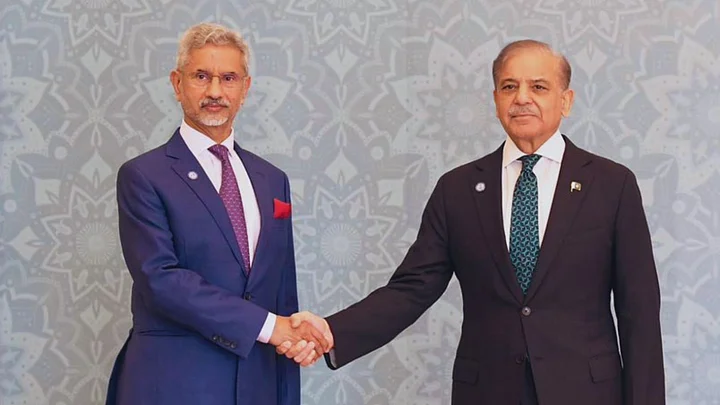After delivering a caustic speech against Pakistan at the UN General Assembly a fortnight ago, it was a transformed Jaishankar who flew down to Islamabad for the SCO (Shanghai Cooperation Organisation) Summit.
During the Indian External Affairs Minister's trip, there were no accusations or jibes or anything of the sort, allowing former Prime Minister Nawaz Sharif to say that this was a time to "bury the past" and move confidently towards the future.
What happened in the interregnum between the UNGA and the SCO meetings?
Did the unsavoury scrap between India and Canada that resulted in Ottawa accusing India of hiring assassins to kill Hardeep Singh Nijjar play a role in India's overtures to Pakistan?
Observers say that the two sides aren’t serious about talking peace. “No one is putting pressure on both sides to be friends again. Then why should we expect any change in circumstances,” asked an observant analyst in Delhi.
Besides stray remarks, what is apparent is that not much should be expected from Jaishankar's handshake with Prime Minister Shahbaz Sharif till there is a major shift in the balance of power in the region.
The Pakistanis were a perfect host for this international event. Not only did they not use provocative language to sour their Indian guest's trip, but they also played along as India controlled the headlines to highlight a choreographed thaw in relations, in stark contrast to the severe deterioration of diplomatic ties with Canada.
India, also, to its credit, did not blame Pakistan for the resurrection of the Khalistan issue (a former head of Canada's intel agency had made ample claims about the same).
The decision to send Jaishankar was taken before Canada's allegations created an extraordinary foreign policy crisis. This was prompted by not just enormous pressure from Russia and China, both deeply invested in the survival of the SCO (often described as the Asian NATO), but also because India has been a signatory to the organisation’s charter that a member would not be in conflict with another.
By their mere presence, both countries violated this commitment. They have tried to convince other SCO members that they are serious about sorting out their differences, but have done precious little.
Though state-sponsored terrorism was a big issue for India and more so for the BJP government that came to power in 2014, to the credit of Prime Minister Narendra Modi, he did make an attempt to build bridges with Pakistan.
His tour of Afghanistan in 2015 and then his trip to Lahore to meet PM Nawaz Sharif was a bold icebreaker, but nothing came out of it.
Distressingly, what we witnessed were attacks in Jammu, Pathankot, and Pulwama that could have brought both nuclear powers closer to another war.
The return of the Taliban in August 2021 and the hostility that they displayed towards Pakistan changed the way India perceived the Af-Pak situation. Pakistan not only did not gain by the departure of the US from Afghanistan but also realised that their plans for maintaining strategic depth had been wrecked.
Afghanistan under the Taliban is fairly well armed, and it does not need any security assistance from Pakistan. Worse, they are strong enough to stop Islamabad from any adventurism.
In some ways, the happenings in Afghanistan deepened Pakistan’s irrelevance to such an extent that the latter has to scrounge for $1 billion worth of loans from the IMF whereas India is swimming in more than $600 billion of foreign exchange reserves.
Foreign policy needs a fat purse. Expectedly, India's financial buoyancy is seducing world powers to ally with us. Pakistan, unfortunately, is largely ignored or shunned.
In these circumstances, why should New Delhi make an effort to normalise ties with Islamabad? Except for nostalgia and good intentions, there is nothing that can push the two countries to make up.
For Prime Minister Modi, patching up with our neighbour is an expression of weakness, electorally speaking. He would need something tangible to show, like Pakistan’s acceptance of the abrogation of Article 370 in J&K or some positive developments in Pakistan-occupied Kashmir.
(The author is the editor of Delhi's Hardnews magazine. This is an opinion piece and the views expressed above are the author’s own. The Quint neither endorses nor is responsible for them.)
(At The Quint, we question everything. Play an active role in shaping our journalism by becoming a member today.)
